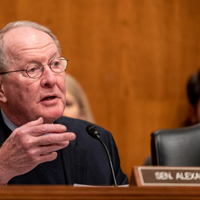As the annual appropriations process gets fully underway on Capitol Hill, Congressman Al Lawson joined 172 other House members in a letter to appropriators recommending a $9 billion FY20 budget for the National Science Foundation. The figure would represent an increase of 11.4% over the current NSF budget. The letter touches on the critical role that the basic research funded by NSF plays in promoting national security, public health, and economic growth. FSU is one of the top-10 public university recipients of NSF funding. The final NSF budget for FY20 will emerge after the next several months of negotiations over the overall federal budget and specific agency/program line-items.
Senate Holds Hearing on HEA and Sexual Assault

On Tuesday, as parts of its effort to reauthorize the Higher Education Act, the Senate Health, Education, Labor and Pensions Committee held a hearing on campus sexual assault and steps to ensure student safety and rights. The HEA sets policy on a broad range of higher education issues such as accreditation, financial aid, and accountability. The hearing specifically looked at existing law, such as provided by the Clery Act, which is supposed to provide transparency around campus crime policies and statistics. The hearing delved in the requirements of due process as well as the definition of sexual assault/harassment, and the impact that the location of an incident (on campus versus off) has on on reporting. The hearing also touched on recent steps by the Department of Education that would impact Title IX.
Panelists included Patricia Howl (Conrad O'Brien), Fatima Goss Graves (National Women's Law Center), Jeannie Gersen (Harvard Law School), Ann Meehan (American Council on Education) and Jeff Howard (East Tennessee State University). Some of the more interesting thoughts shared included the need for federal government definitions of sexual assault/harassment, timely reaction to reported incidents, procedural fairness for both sides and preservation of a student's ability to address a sexual assault even if it has occurred off campus.
HEA reauthorization will continue to move forward on parallel tracks in the House and Senate.
FY20 President's Budget Request Released
On Monday, the White House released final details on its Fiscal Year (FY) 2020 budget request to Congress. The release marks the official beginning of the FY20 appropriations process on Capitol Hill, which will play out over the next several months. A President’s Budget Request (PBR) simply reveals the spending and policy priorities of an administration. Congress ultimately decides specific allocations for federal agencies and programs, after hearings with agency heads and input from constituents. The FSU Office of Federal Relations is currently working with its counterparts in the State University System of FL as well as with the national higher education associations to send a unified message to Congress that the research and student aid line-items in the budget need to be given a high priority in the FY20 cycle.
As widely reported, over the last few days, the White House budget proposes significant reductions to agencies and programs of interest to the higher education community. Of particular note, the PBR includes:
- $7.1 billion for the National Science Foundation, a decrease of $975 million (-12%);
- $14.1 billion for Department of Defense Science & Technology, a decrease of $1.9 billion (-12%);
- $3.6 billion for the Defense Advanced Research Projects Agency, an increase of $124 million (+3.6%);
- $5.5 billion for the Department of Energy Office of Science, a decrease of $1.1 billion (-16.5%);
- elimination of the Advanced Research Projects Agency for Energy;
- $34.4 billion for the National Institutes of Health, a decrease of $4.7 billion (-12%);
- $6.3 billion for the National Aeronautics and Space Administration Science Mission Directorate, a decrease of $601 million (-8.7%);
- $463 million for the Environmental Protection Agency Office of S&T, a decrease of $243 million (-34.4%);
- elimination of the National Endowment for the Humanities;
- elimination of the Regional Education Laboratories, a component of the Institute of Education Sciences;
- elimination of the Supplemental Education Opportunity Grant that is currently provided by the Department of Education;
- $500 million for the Federal Work Study Program, a decrease of $630 million (-55.8%); and
- a Pell Grant maximum individual award of $6,195, same as current, rescinding $2 million in the program surplus that is held to provide future stability of the program.
The allocations above are similar to those seen in the last two White House budget requests. During both appropriations cycles, Congress acted in a bipartisan fashion to maintain and in several cases increase support for research and student aid programs.
Within the above agency/program names, I have included hyperlinks to more detailed information from the budget request. The hyperlinks include helpful narratives of the intent behind each proposed allocation. Additionally, the Association of Public and Land-grant Universities (APLU), of which FSU is a member, has a helpful chart that captures funding recommendations for the line-items above that the higher education community will advocate for with Congress. Please contact Jonathan Nurse if you have questions about the funding status of any federal agency, program or initiative.
DARPA Announces Opportunity to Meet with Program Managers
The Defense Advanced Research Projects Agency (DARPA) Defense Sciences Office (DSO) announces the opportunity for potential performers to meet with a DSO program manager (PM) to discuss mutual research interests. ... Read More
FSU Joins Groups in Calling for $9B NSF Budget
FSU joined 65 other universities and national associations in calling on Congress to provide a $9 billion FY20 appropriation for the National Science Foundation. ... Read More
Higher Education Committee’s Recommendations to Congress on HEA Reauthorization
The Higher Education Committee of 50 released recommendations to Congress on the Higher Education Act reauthorization. ... Read More
Research Community Advocates for $2.5B NIH Increase
FSU joined over 300 organizations in a statement recommending a $2.5 billion (6.4%) FY20 increase for the National Institutes of Health. ... Read More
NIH Update on Plans to Combat Sexual Harassment in Science
Today, the National Institutes of Health provided an update on plans to work with the extramural research community to address sexual harassment in science. ... Read More
FSU and The Coalition for National Security Research Urge Hill to Raise Budget Caps
In a recent letter, FSU and 83 other universities that make up the Coalition for National Security Research called on Congress to raise the overall discretionary budget cap for Fiscal Years 2020 and 2021. ... Read More
FY19 Appropriations Process Concludes
Today marks the end of the Fiscal Year 2019 appropriations process in DC, which began over a year ago when President Trump released his budget request to Congress for federal agencies and programs. ... Read More
Partial Government Shutdown Possible Later this Week
As February 15th is quickly approaching there is the looming question of, will there be another partial government shutdown? ... Read More
Chairman Alexander's Priorities for a 2019 Reauthorization of the Higher Education Act
On Monday February 4th, Chairman Alexander laid out his priorities for the 2019 reauthorization of the Higher Education Act. ... Read More
Resumption of Operations at the National Science Foundation
The National Science Foundation released information announcing its resumption of operations since the government shutdown. ... Read More
Shutdown a Long-Term Possibility, Impact Stories Sought
The partial federal government shutdown in nearing the prior record of 21 days and there is no end in sight. ... Read More
White House Science Adviser Confirmed
In the final hours of the 115th Congress, the United State Senate confirmed the nomination of University of Oklahoma Vice President for Research, Kelvin Droegemeier to head the White House Office of Science and Technology Policy. ... Read More
Dept. of Energy Year in Review
The Department of Energy has released a review of notable 2018 accomplishments. ... Read More
NSF Releases Shutdown Guidance
The National Science Foundation has released guidance for proposers and grantees regarding its operational status during the partial government shutdown. ... Read More
Partial Federal Government Shutdown Looms
Federal agencies that have yet to receive full year appropriations for 2019 will cease non-essential operations at midnight unless the White House and Congress forge a last minute agreement, which appears highly unlikely at this point. ... Read More
Sen. Nelson Shares Remembrance of Former President Wetherell
On Dec. 18, Senator Nelson issued a statement in remembrance of former FSU President Dr. T.K. Wetherell. ... Read More
White House Puts Forward $279 Million Five-Year STEM Plan
The Trump Administration is looking to build students literacy in STEM, increase diversity, equity, and inclusion in STEM, as well as prepare workers for careers in the STEM field. ... Read More
FSU Joins Stakeholders in Support of DOD Basic Research and S&T Programs
Last week, FSU and other members of the Coalition for National Security Research crafted a letter to Department of Defense Secretary James Mattis and Office of Management and Budget Director Mick Mulvaney urging them to increase funding in their FY2020 budget for basic research and science and technology programs. ... Read More
Deal Emerging to Avoid Partial Government Shutdown
Leaders on the Hill and the administration have signaled that a deal is on the horizon to keep federal agencies that are currently operating on stopgap appropriations to remain open beyond December 7 when funding is set to lapse. ... Read More
New Poll Captures Voters Thoughts on Scientific Research
A recent poll conducted by The Science Coalition finds voters across the political spectrum agree that the U.S. should be the global leader for scientific research and technology and that taxpayer funds should support those efforts. ... Read More
Dept. of Education Proposes Title IX Changes
In recent events, Secretary of Education, Betsy DeVos, have suggested proposed changes to Title IX dealing with how Colleges and Universities investigate sexual misconduct. ... Read More
Funding for Higher Ed. R&D Increases to over $75 Billion
According to the NSF, funding of higher education R & D increased at 4.7 percent. This includes all areas of research that saw increases for the second consecutive year. ... Read More

